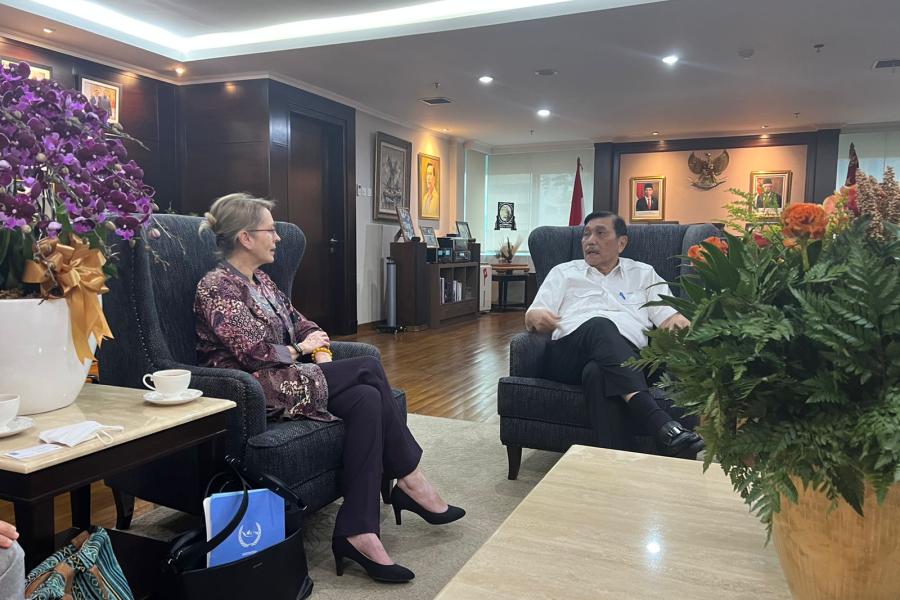Turning the Tide for Ocean Sustainability
29 September 2022
Jakarta, 29 September 2022 – The United Nations and the Government of Indonesia will closely cooperate and complement each other in desgining and implementing projects to protect and sustainably develop the oceans. Coordinating Minister for Maritime Affairs and Investment Luhut B. Pandjaitan and UN Resident Coordinator Valerie Julliand discussed today concrete implementation steps under the National Blue Agenda Actions Partnership, to be launched on the sidelines of the G20 summit in Bali in November.
Indonesia, the center of the world’s marine biodiversity, is turning the tide on the sustainable use of the oceans with the support of the UN and other development partners, Coordinating Minister Luhut said.
“Indonesia is committed to support the completion of the National Blue Agenda Actions Partnership,” he said, adding that the Partnership will help Indonesia achieve its national medium-term plan targets. Indonesia has committed to a healthy and sustainable ocean. I believe we can recover together and recover stronger on a sustainable blue road.
The Partnership will focus on the marine and maritime sectors, ensuring a healthy environment and contributing to prosperity under four pillars: blue health, blue food, blue innovation and blue finance.
Ms Julliand, said: “Protecting oceans, and their resilience is important not just for food security and economic growth, but also in the fight against climate change. This is a good example of why development objectives need to be tackled in a holistic manner across sectors. And we are doing exactly that in Indonesia.”

Healthy and resilient marine and coastal ecosystems are fundamental to sustainable development. They are a source of food, energy and minerals, allow transport of goods across the globe and regulate the climate. However, coastal and marine ecosystems in Indonesia have begun to show signs of degradation from infrastructure development, extractive industries and pollution, threatening the livelihoods of ocean-dependent communities.
At a workshop earlier this week, organized by the UN in collaboration with the Coordinating Ministry for Maritime Affairs and Investment (CMMAI / Kemenko Marves) and other government partners, speakers mapped out the areas of the Partnership. They reviewed a wide range of ongoing and planned initiatives, from paying fishers to collect plastic debris in the ocean to diversifying job opportunities for coastal communities in sectors such as tourism, and more. Speakers also discussed ways to finetune blue finance to balance food production and the conservation of the environment.
The Partnership is based on complementarities between international and national endeavours, ensuring higher overall impact. It involves several UN agencies in Indonesia (FAO, ILO, UNDP, UNEP, UNESCO, UNIDO, UNOPS and UNWOMEN), working closely with relevant ministries and government agencies as well as the international development community in support of Indonesia’s role as a global leader on a sustainable Blue Agenda.
As the Chair of the G20 Presidency, Indonesia is the initiator Ocean 20 and promotes – in line with the UN Sustainable Development Goals – three main issues on ‘life on land, and below water’: supporting a stronger sustainable recovery, promoting effective land and marine ecosystem management and resource mobilisation to support climate change mitigation and adaption.
Ms Julliand added: “This Blue Partnership, including a Plan of Action, comes at an auspicious time, as the world looks at Indonesia during this year of the presidency of the G20. As the largest archipelagic nation in the world, Indonesia can be an example to other countries in sustainable, ocean-based development.”
***
About the UN in Indonesia:
The United Nations (UN) is an international organisation founded in 1945. It is currently made up of 193 Member States. The mission and work of the United Nations are guided by the purposes and principles contained in its founding Charter. In Indonesia, the UN is committed to supporting the Government of Indonesia in achieving the Sustainable Development Goals (SDGs) by 2030. The UN Country Team is led by the UN Resident Coordinator (RC), the representative of the UN Secretary-General at the country level. RCs lead UN Country Teams in consultations with the Government to define and agree on the UN strategic response to the Government’s development priorities in implementing the 2030 Agenda.
About the National Blue Agenda Partnership:
There are four main pillars of the Partnership:
- Blue Health: (blue conservation and biodiversity, restoration, ecosystem management, coastal spatial planning)
- Blue Food (production, consumption, marine and aquaculture, market penetration and access on supply chain, food security system, small-scale producers, sustainability and product competitiveness certification, innovation and investment angle)
- Blue Innovation (science, technology, applications, human development, capacity building, employment, livelihood, e-applications)
- Blue Finance: (creative finance, payment for ecosystem services, blue economy, blue bond, blue Sukuk, incubation/ start-up).
Contacts:
-Miklos Gaspar, Director of the UN Information Centre in Jakarta (UNIC): miklos.gaspar AT un.org
-Andreas A. Hutahaean, Coordinating Ministry of Maritime and Investment Affairs (Kemenko Marvest): andreashut@maritim.go.id







